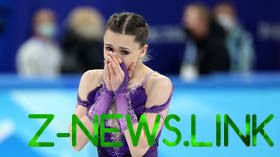
The Beijing Games closing ceremony on Sunday brought an end to a Winter Olympics which became as high-profile for developments away from the stadiums and slopes as it did for sporting action.
Russian figure skater Kamila Valieva had already returned to Russia as the flame went out at the ‘Bird’s Nest’, ending a 16-day event that was dominated by the 15-year-old’s anti-doping case.
Here, we look at what happened to the pre-Games gold medal favorite and some of the other moments that made headlines at a Games like no other.
Biden leads diplomatic boycott
There had been months of escalating tension over a likely diplomatic boycott ahead of the Games, including strong words from leading figures such as United States House of Representatives Speaker Nancy Pelosi imploring politicians to back the move as a moral obligation.

The White House confirmed its boycott over “ongoing genocide and crimes against humanity in Xinjiang”, as well as other human rights abuses, on December 6, leading to a long list of countries joining them over alleged atrocities against the Muslim Uighurs in north-west China, which Xi Jinping’s government has always denied.
China promised counter-measures. Its diplomats rubbished the boycotts, calling them a politicization of the Games – a view shared by leaders including Russian President Vladimir Putin, who was one of the dignitaries at the opening ceremony.
Human rights campaigners and critics of the gesture alike cited the Olympic charter of unity as they articulated their strongly-held beliefs. One result that everyone could perhaps agree on was a Games that had a distinctly political feel to its build-up and beginning.
Environmentalists ask questions over fake snow
With paltry natural snowfall in the region, leaders found themselves defending their use of 49 million gallons of water to create the required artificial snow.

Northern China has had water shortages in recent years, and some experts described the Games’ claims of sustainability as meaningless while claiming that they might as well have taken place on the moon under artificially-created conditions.
Fake snow has long been used at the Olympics, but the scale of the endeavor seemed staggering this time around.
Organizers have talked up the green ethos of the Games, including claims that all of the venues were powered by completely renewable energy at an event which they say is on track to be carbon-neutral.
Uighur athlete and army commander carry the Olympic flame
Cross-country skier Dinigeer Yilamujiang’s part in lighting the Olympic cauldron was not universally popular because she is of minority Uighur descent.

China is accused of using forced labor on the group in internment camps in the Xinjiang region, leading Zumretay Arkin, of the World Uyghur Congress, to claim that the involvement of Yilamujiang was overwhelmingly driven by political motivations.
But International Olympic Committee (IOC) spokesperson Mark Adams called the participation of Yilamujiang while millions around the world were watching a “lovely concept”, adding that she was “perfectly entitled” to play a key part in the opening.
India also took exception to an army commander acting as a torchbearer for the relay because he had been among the troops who fought in a territory disputed by India, China and Pakistan, calling it a “regrettable” politicization.
Athletes told to use burner phones amid fears of spying
Two weeks after alleged security flaws were identified in the official Games app for athletes and staff, the FBI warned American athletes to leave their personal devices at home to reduce the risk from “malicious cyber activities”.

British athletes were given temporary devices, as were Dutch competitors, who had them destroyed when they returned from the Games. The Australian and Canadian Olympic Committees also issued warnings their traveling parties over the issue.
China dropped censorship of western sites such as Facebook and Google, but a report by cybersecurity group Citizenlab claimed personal data could be accessed and passed on to third parties.
The report claimed suspicions of censorship and surveillance were warranted but added that the “widespread lack of security” in the app was more likely to be a reflection of software developer priorities than a “vast government conspiracy”.
Team USA denies telling athletes not to give opinions
Pelosi offered a stark warning to Team USA athletes considering speaking out on political issues, claiming she worried about what the “ruthless” Chinese government “might do to their reputations, to their families.”

US Olympic Committee CEO Sarah Hirshland responded to questions about those words by saying that athletes had been reminded of the principles of sportsmanship and the Olympic charter, rather than being told not to speak their minds.
Yang Shu, an international relations official for the Games, had confirmed that athletes faced accreditation cancelation or punishment for sentiments conflicting the Olympic spirit.
Perhaps it was the prospect of possible recriminations that resulted in a Games less replete with political gestures than the Tokyo Olympics, where acts of symbolism seemed to be a daily occurrence.
Ski suit violations lead to disqualifications
Strict measures around ski jumping suits have never caused as much consternation as they did at the team ski jump in Beijing, when Norway, Austria, Japan and Germany were among the teams to fall foul of rules stipulating that suits must not give athletes an unfair advantage.

Individual silver medalist Katharina Althaus, of the odds-on favorites Germany, was disqualified for a suit violation during qualifying despite her team claiming that she had used the same outfit to win her first medal.
The explanation for the controversy is likely to have centered on Althaus’s weight changing between events, meaning that her suit would need to have been carefully adjusted accordingly.
“For me, it is a puppet theater,” raged German national team coach Stefan Horngacher. “I am unbelievably angry and I don’t understand it.”
Kamila Valieva’s anti-doping saga
Many had anticipated the Games as a zenith for Kamila Valieva, the teenager regarded as the world’s best figure skater and a red-hot favorite to take individual gold as part of a formidable Russian team.

True to form, Valieva became the first woman to land a quad at the Olympics as part of a world record score that helped her team win the team competition on February 7.
A day later, the dream became a nightmare. A heart drug on the World Anti-Doping Agency’s banned list had been detected in a test taken by Valieva in December, leading to the medal ceremony for the team event being called off and an avalanche of mud-slinging against Russia to begin.
The Court of Arbitration for Sport dismissed the IOC and International Skating Union’s bid to have Valieva suspended from the rest of the Games, but she was clearly badly affected in a misfiring final performance under huge pressure in the individual competition. The sorry saga overshadowed the Olympics and is yet to be settled, with the team result still not confirmed.
Alexandra Trusova makes history, then threatens retirement
Alexandra Trusova performed superbly during the Games, peaking when she landed a record-setting five quads to the sound of Florence + the Machine’s ‘Call Me Cruella’ and the Stooges’ “I Wanna Be Your Dog’ in the individual event.

In the immediate aftermath of her dazzling feat, Trusova was caught on camera howling with fury. “I hate this sport,” she said, appearing to be angry at finishing second behind compatriot Anna Shcherbakova. “I won’t go onto the ice again.”
It was a troubling response to watch even by the emotionally charged standards of decisive Olympic events, although Trusova later played it down and said it was partly due to homesickness.
The two-time world junior champion composed herself for the medal ceremony, which the IOC had announced would not take place had Valieva achieved a podium position. The unrelenting scrutiny Trusova, Shcherbakova and Valieva had endured in the run-up to the final event cannot have helped ease the intense pressure the teenage trio were under at the Capital Indoor Stadium.
Thomas Bach takes aim at Tutberidze
IOC president Thomas Bach has often been criticized for blustering and pulling his punches on key issues. The lawyer did not hold back on one of Russia’s most successful figure skating coaches.

“You could feel this chilling atmosphere, this distance,” he said of footage of Eteri Tutberidze’s reaction to her star pupil, Valieva, after the individual event, describing what he perceived as “tremendous coldness” from the woman who has also masterminded Trusova’s success.
Russian Olympic Committee (ROC) president Stanislav Pozdnyakov pointed to the effort it takes Tutberidze to add to her long catalogue of success year after year, and legendary Russian ice dancer and coach Alexander Zhulin accused Bach of speaking “cruelly and incorrectly” about Tutberidze and the Russian team.
Tutberidze reacted pointedly to Zhulin’s remarks. “At this moment, I find myself at a loss over the assessment of our work by the esteemed Mr. Bach,” she replied, thanking Zhulin for his support.
Media accused of mistreating Mikaela Shiffrin
Fans voiced concern after one of Team USA’s brightest medal prospects, three-time overall World Cup champion and triply Olympic medalist Mikaela Shiffrin, was portrayed in despair on the slopes at one point in a campaign she will want to forget in a hurry.

The 26-year-old competed in every discipline of her sport at the Games, and there were fears that the close-up media coverage of her struggles could lead to the same mental health ordeals suffered by the likes of gymnast Simone Biles and tennis ace Naomi Osaka in 2021.
Despite her disappointment, Shiffrin showed admirable grace as she responded to opportunities to cast the media as “haters” at the end of her underwhelming Games.
“You just need to get up,” she said of her approach to recovering from the succession of setbacks, thanking reporters for their support and observing their part in strengthening her connection with her supporters.
Trio commit doping violations
Iranian Alpine skier Hossein Saveh Shemshaki carried his country’s flag at the opening ceremony, only to have his accreditation canceled as he was ordered to leave the Olympic village following a positive test for a banned steroid.

The veteran said skiing had had its “ups and downs” for him and acknowledged that his drug shame had denied him the “happy ending” he wanted for his career.
Cross-country skier Valentyna Kaminska also retired after testing positive for a steroid.
Kaminska was one of two Ukrainians to fail a drug test at the Games, joined by bobsledder and former deadlifting champion Lidiia Hunko.
Skeleton racer pleads for help
Amid fears over the welfare of Olympians at these unusual Games, skeleton racer Kim Meylemans’s tears over a Covid ordeal was an early cause for concern after the Belgian issued a tearful video over her treatment by organizers.

Meylemans was stunned to be taken to a different facility rather than moved to the Olympic village despite returning multiple negative Covid tests during a trying isolation period.
Global Athlete Director General Rob Koehler called Meylemans’ treatment “totally unacceptable” following the emergence of the shocking clip showing the distraught athlete pleading to leave isolation.
The IOC intervened as Meylemans’ plight reverberated around social media, and there was relief when the athlete later confirmed that she had been moved to an isolation wing in the Olympic village where she said she felt safe.
Speed skater Daniil Aldoshkin fires insult after win over US rivals
The thrill of success got the better of Daniil Aldoshkin, a 20-year-old speed skater who raised his hands with his middle fingers extended as his team crossed the line to beat Team USA and guarantee themselves the silver medal they ultimately earned behind Norway.

One of Aldoshkin’s teammates, Ruslan Zakharov, explained that the emotional reaction was purely a product of beating the clock, while Norwegian rival Halgeir Engebroten said he was also satisfied that Aldoshkin’s misplaced exuberance had been a reaction to reaching the final.
The gesture was an “outburst of emotion”, according to Alexei Kravtsov, the president of the Russian Skating Union.
Kravtsov pointed out that Aldoshkin was a debutant winning his first Olympic medal as part of a team who set a record in the semifinals. “I’m sorry if this offended anyone,” added the athlete.
Veronika Stepanova asks reporter to ‘check my undies’
Uncompromising Russian ski star Veronika Stepanova was not shy to speak her mind on social media during the Games, variously taking aim at media depictions of female athletes, claiming she would have performed better with a kiss from her boyfriend and offering her hope that Putin would take a greater interest in her sport as a result of his nation’s cross-country success.

After the most important day of her career, when she helped the ROC team secure gold with an exhilarating show of endurance, Stepanova was unimpressed by one reporter who she believed had accused her of using a banned lubricant.
“I have a suggestion… why don’t you demand to do a check in my undies?” the 21-year-old sensation asked, joking that her purported accuser might have discovered a motor in her briefs.
The incident was not the first time a Russian clashed with a Scandinavian outlet: the president of the Russian Ski Association, Elena Vyalbe, said she would boycott Norwegian media over a comment that Russian athletes should have been barred from appearing in Beijing.
Row breaks out after Asian Americans are called ‘vividly overrepresented’
New York Times writer Andrew Keh claimed a description of Asians as being “vividly overrepresented” in figure skating was a term based on conversations with “multiple Asian American sociologists”.

The Times said that stars including individual Beijing Games champion Nathan Chen had transformed a sport that was “almost uniformly white” during the 1990s, adding that their dominance was disproportionate to the seven percent of the US population made up by Asians.
Its choice of words did not go down entirely well online, with accusations of exceptionalism, divisiveness and even racism greeting the articles.
The outlet called figure skating in the US “plainly an Asian American sport”, observing that, for the second successive Games, four of the six figure skaters in singles events on Team USA were Asian-American.
US-born China star Eileen Gu accused of treachery
Entering the Games as a freestyle skiing favorite and touted as a transformative force in the sport by one of her many lucrative backers, Eileen Gu perhaps had more than anyone at stake.

The 18-year-old delivered spectacularly by becoming the first athlete in her sport to win three medals in a single Olympics and the youngest Games champion in the discipline, but questions around the California-born crossover star’s switch from Team USA to China in 2019 linger.
Gu, who has Chinese grandparents, is accused by some of taking worryingly little heed of China’s human rights record when she made the change in 2019, failing to address whether she has changed nationality and appearing to defend the country she competes for against legitimate charges of censorship.
Part-time model Gu has faced accusations of treachery towards the US. There has also been a debate around the credibility of her claims to be a realistic role model for girls, with critics pointing to what they describe as an unusually privileged background that is unattainable to all but the most fortunate of youngsters aiming to follow her lead.
Women’s ice hockey teams wear Covid masks
Every sports fan will hope that the Beijing Games are the last to take place against the backdrop of a global pandemic. Hockey had already been the sport most affected by Covid before the games thanks to the withdrawal of NHL players because of the rise of the Omicron variant.

A women’s group stage match between the ROC and Canada then descended into farce when the start was delayed by more than an hour because the Canadian players reportedly refused to take to the ice while the results of the ROC team’s Covid tests taken earlier in the day remained unclear.
Russian goaltender Maria Sorokina said her team agreed to play in masks to avoid embarrassment, removing them when the results arrived before the third period. Canada kept their masks on anyway, and Finland followed suit in their match against Russia.
“It is very difficult to play in masks,” the ROC’s Polina Bolgareva told Match TV, saying that denser Chinese masks and a lack of supplied oxygen had made players feel dizzy. “But both teams were in the same conditions.”
Tennis ace Peng Shuai appears
One subplot that did little to help China’s PR cause ahead of the Games was the controversy around Peng Shuai, the tennis star leaders are accused of silencing following claims of sexual assault published on her social media account against a former senior member of the Chinese Communist Party.

Peng was seen alongside Bach at the big air freestyle skiing final and at a mixed curling match between China and Norway, shortly after she gave an interview to L’Equipe in which she again denied making her in-depth post detailing alleged abuse by the politician, which swiftly disappeared from her account.
Many continue to question whether the two-time doubles champion is acting of her own free will, and the interview with L’Equipe is said to have been carefully-managed by Chinese authorities. Peng’s public appearances have also been announced by Chinese state-affiliated media.
WTA chairman Steve Simon, whose organization has pulled events from its lucrative China market until its concerns over Peng are alleviated, said his “thoughts remain” with Peng, reiterating his call for a formal investigation into the allegations and a chance to meet the player privately.
Teams find the Olympic menu hard to digest
In the age of specialist dietitians and quarantine meals, complaints about nutrition seem inevitable at major events.

Germany ski team coach Christian Schwaiger described the catering as non-existent, understandably arguing that crisps, chocolates and nuts are no substitute for hot meals when it comes to elite sport.
Russian biathlete Valeria Vasnetsova said she had grown pale, cried every day and suffered stomach cramps over the insufficient sustenance she had been offered in isolation, and short track medalist Semion Elistratov was not the only ROC member to speak of their excitement at a more familiar menu upon returning home, Semion Elistratov, naming dumplings, borscht and pickle as the items he had craved.
Athletes on some teams had reasons to be cheerful thanks to their nations publicly putting special measures in place: Team USA brought their own food and Australia repeated their caffeination drive of the Tokyo Games by supplying a barista to pump out coffee to their squads.
Tensions and joy between Russian and Ukrainian athletes
Ukrainian athletes were reportedly warned by their country’s minister of youth and sports, Vadim Gutzeit, not to pose with Russians because of “provocations” against a backdrop of political tensions between the countries.

They might have thought twice about that in any case after high jumper Yarolsava Mahuchikh was immediately summoned by Ukraine’s defense ministry following the Tokyo Games because she had posed with Russian rival Maria Lasitskene and the Ukrainian flag.
The issue occasionally flared again in Beijing. Russian figure skating icon Alexei Yagudin claimed Ukrainian representatives were guilty of a “real abomination and disgrace” after what he perceived as their failure to recognize Valieva’s achievement in her stunning performance in the team competition.
Freestyle skier Oleksandr Abramenko did not hesitate to congratulate Ilya Burov after claiming silver for Ukraine and finishing ahead of the Russian for a second consecutive Games, with the pair enthusiastically hugging under his country’s flag in a repeat of their 2018 embrace.
Harrowing weather conditions strike
The weather in Beijing was savage at times. Six-time World Championships medalist Frida Karlsson was “completely destroyed” by temperatures which Anders Bystroem, who was also part of the Sweden team, could have dropped as low as -35C with wind chill.

There were concerns that events were being held later in the day, when temperatures were colder, in order to appease European TV schedulers rather than put the health of athletes first.
The cross-country skiing mass start race, won by Russian skier Alexander Bolshunov, was delayed and reduced in length from 50km to 30km as athletes covered their faces with tape and found frost forming on their lips in brutal cold – although Brit Andrew Musgrave angrily called those decisions a “f*cking joke” in response to conditions being “a bit cold and windy”.
Brave Remi Lindholm might not have shared those views. The Finnish competitor suffered a frozen penis in “one of the worst competitions I’ve been in”, describing the pain as his appendage warmed up afterwards as “unbearable”.
© 2022, paradox. All rights reserved.





